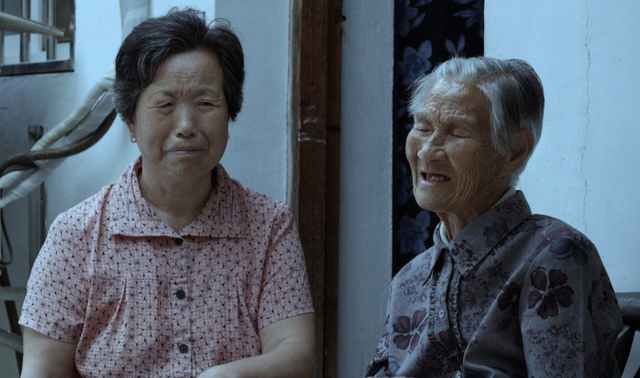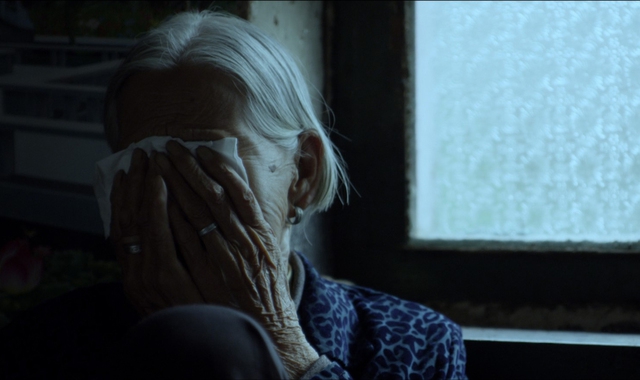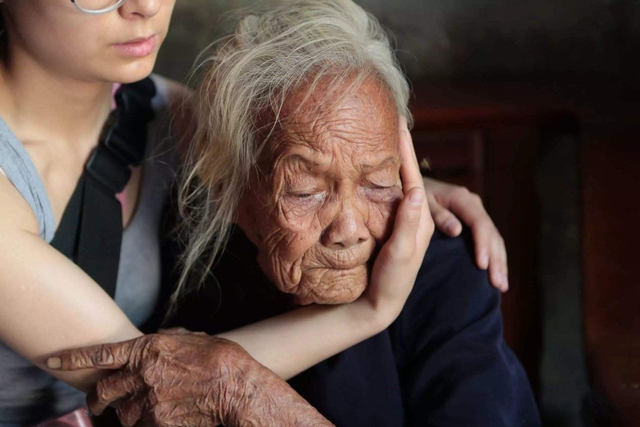 |
|
Volunteers talks with Park Cha-soon, a former comfort woman in China. (all photos provided by Asia Home Entertainment)
|
“Twenty-Two” has become highest-grossing Chinese documentary ever
She had forgotten almost all of her Korean. As a child, she had an excellent memory and could sing along immediately with any song she heard. Now, at over ninety years of age, her memory came and went. But she still clearly remembered a few verses from her hometown song: “Arirang, arirang, arariyo / Crossing over Arirang pass / The love who abandons me / Will not go ten li before his feet hurt.”
Living in China, Park Cha-soon (1922–2017) went by the name Mao Inmei. Her father went to China to earn a living. When he died, his wife returned home, leaving their five-year-old daughter behind. Left under her grandmother’s care, Park was 18 in 1941 when she was taken to a Japanese military comfort station on a false promise to give her a job at a large sock factory.
She survived the war, but had no real way of returning home. She remained behind in China, where she married a local bachelor. But with Park’s experience as a comfort woman leaving her unable to conceive, the two adopted a local girl as a foster daughter. Looking back on a harsh life deeply furrowed with the marks of history, Park said, “I’m afraid I’ll live too long. There’s no point.”
 |
|
Park Cha-soon (right) and her adopted daughter in the film Twenty-two.
|
“Twenty-Two” is a South Korean-Chinese documentary co-production that focuses simply on recording the voices of the surviving former comfort women in China. The title represents the number of comfort women survivors still living in China at the time of filming in 2014. Director Guo Ke did not even include background music, aiming to strip away any kind of artificial inclusions. Instead, he simply waits for the elderly survivors to share their life experiences.
The documentary, which took four years to complete, drew 5.5 million viewers in China when it opened on Aug. 14 last year. It earned back 60 times its production cost and became the highest-grossing Chinese documentary ever. A year later, the film is making its South Korean premiere on Aug. 14. The date, which marks the anniversary of the late former comfort woman Kim Hak-soon giving the first ever public account of her experience during a 1991 broadcast appearance, was chosen as South Korea’s first national designated day this year.
 |
|
A former comfort woman in China weeps while telling her story.
|
A filmmaker’s road in facing a harsh historical truth
Fate is how CEO Kim Won-dong of the production company Asia Home Entertainment described the circumstances leading up to South Korea and China’s co-production of “Twenty-Two” as a way of addressing the comfort women issue. Kim had already produced two films on the topic: the fictionalized “Tuning Fork” (2014) and the televised documentary “Meeting the Girl” (2014). He encountered Guo and his group while visiting Beijing to meet with Park Cha-soon.
“We went to China to bring Mrs. Park home and film a TV program about the process, and Guo Ke was in the middle of filming ‘Twenty-Two’ at the time,” he explained.
Moved by the passion of the director – who sold off his studio apartment to get “Twenty-Two” made – and the attention to detail in the planning and the preliminary coverage, Kim immediately decided to join forces. “The plan was for Mr. Guo to produce the film as planned, while we worked on raising the money for production costs,” he said. “The only condition was that they had to devote time to telling the stories of [survivors] Park Cha-soon and Lee Su-dan.”
But finishing the filming and securing a release would take more than passion. The production money soon ran out, and no distributors in either China or South Korea showed much interest.
“‘Spirits’ Homecoming,’ a film about the comfort women issue by director Cho Jung-rae, was a big hit at the time, and Guo Ke had the idea of using a crowdfunding model along that film’s lines,” Kim said. “The heavens must have been moved, because all of these conscientious celebrities – including director Feng Xiaogang, actors, and producers - began promoting it on social media.”
With 32,099 people participating, they were able to raise their target amount of 1 million yuan (U$146,000) – and the film went on to achieve a record box office performance.
In Aug. 2017, “Spirits’ Homecoming” director Cho Jung-rae visited China at Guo’s invitation.
“As soon as I arrived, they took me to Park Cha-soon’s grave site in Hubei Province,” Cho recalled. “Her [foster] daughter stood in front of her funeral portrait and said, ‘People have come from the home country you wanted to see so much.”
“I remember holding each other right and crying a lot,” he said.
 |
|
Volunteers console a victim of Japanese sexual slavery in China.
|
Changing China’s historical perspective
In contrast with the situation in South Korea, the comfort women issue only really began reaching awareness in China through “Twenty-Two.” In an atmosphere that stresses China’s “greatness,” painful episodes from history like the comfort women issue are not often discussed.
“August of last year was when [China’s] ‘Korean Wave ban’ was in full effect, so we couldn’t really call attention in China to the fact that this was a South Korea-China co-production. Hopefully, its release in South Korea will result in a growing sense of this being an issue South Korea and China need to reach across borders to respond to.”
The conclusion of “Twenty-Two” shows the funeral of former comfort woman Zhang Kaixiang (1925–2014). Green grass begins to sprout over the snow-covered grave as spring arrives. In terms of time, it happens in a matter of moments. The number of surviving former comfort women in China dropped from 22 to six in the four years between 2014 and 2018.
“That’s why we feel so anxious. The reason we insisted on having a release at the height of the film season on Aug. 14, even when we knew it might not be a hit, was to honor that intention,” Kim Won-dong explained.
“The hardest things for me is when people say things like, ‘Not the comfort women issue again.’
The people who make movies about the comfort women issue often say it feels like homework that you never really finish. Wouldn’t that homework be finished faster if everyone joined in?”
By Yu Sun-hui, staff reporter
Please direct comments or questions to [english@hani.co.kr]












